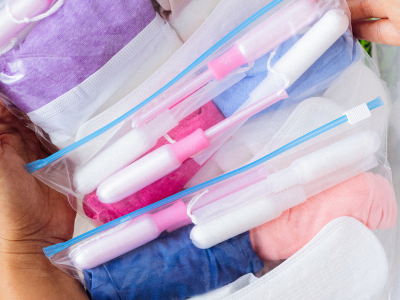Being on your period—or going through menopause—should never stop you enjoying the hills. But these natural parts of life do come with a few practical challenges when you're away from toilets or facilities. With some forward planning and the right kit, it’s easy to stay clean, comfortable and confident outdoors, no matter what your body’s doing.
Be prepared
It’s a good idea to carry a small period kit in your pack year-round, even if you’re not expecting your period. Changes in activity, temperature or stress can sometimes cause earlier or unexpected bleeding—especially in young people or during perimenopause.
Your kit might include:
Period products of your choice (e.g. tampons, pads, menstrual cup or reusable pants)
A few resealable hygiene or dog poo bags (for used products)
Hand sanitiser or biodegradable wipes
Spare underwear and/or a small cloth
Pain relief (e.g. ibuprofen or paracetamol)

Choosing products for the outdoors
All period products can work outdoors, but here are a few things to consider:
| Product | Good because... | Be aware... |
|---|---|---|
| Tampons & Pads | Easy to use and familiar for most | Must be packed out as waste |
| Menstrual Cup | Long wear time, no waste | Needs practice to use and water to clean |
| Period Pants | Comfortable and reuseable | Need a change if soaked through |
Used period products should never be buried or left behind.
Pack them out with your rubbish, just like you would with used toilet paper
Consider using reusable options like menstrual cups or period underwear to reduce waste
Going to the toilet outdoors whilst on your period should be treated the same way as going for a poo - blood should be buried and away from water
Hot flushes or night sweats
Joint aches or stiffness
Increased need to pee
Irregular or heavier bleeding
Tiredness or low mood
Irritable
Migraines
Dress in layers – Hot flushes are easier to manage when you can cool off quickly
Bring extra pads, pants or tissues – Just in case of unexpected spotting or bleeding
Plan for more toilet stops – If you're peeing more frequently, consider route options with easier access to shelter or privacy
Listen to your body – It’s OK to adjust your pace or opt for shorter routes on days when your energy’s lower
Stay hydrated and fuelled – Hormonal changes can affect blood sugar and hydration levels
Talk to your GP - Some menopause symptoms, like sudden migraines, can be debilitating. If you're worried about your symptoms before exercising, get advice from a medical professional on how to best prepare for and manage your symptoms.